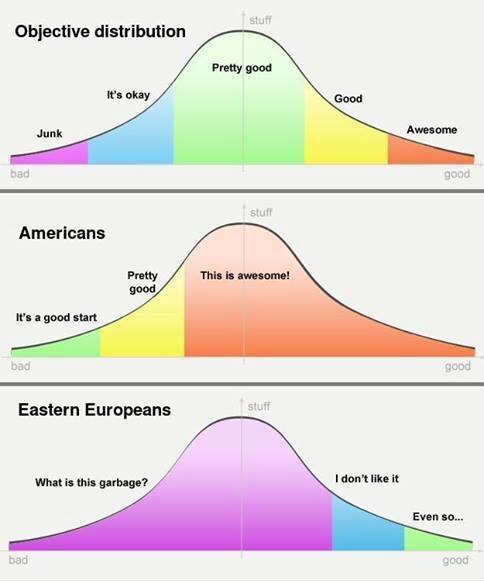📰 “Czechs Generally Satisfied With Life, But Not Necessarily Happy.” 📰
I had a field day of giggles and knee-slapping when I saw this headline in the Brno Daily (from March). 🤣
It’s the most Czech thing I’ve ever heard. And I promise I say that with love.
Let me explain where I’m coming from…
1. The difference between “satisfied” 🙂 and “happy” 😁
I never heard the word “satisfied” (spokojený) so much until I came to Czech Republic. I assume it is more a figure of British English, and Britain is not known for being an overly-enthusiastic culture either. When used in American English, I’d be more likely to interpret this as “full enough” after eating, rather than something that describes an emotion.
Of course, everyone knows what “happy” (šťastný, radostný) means. But this seemingly simple word – which any English language learner would hear in their first few months – is pretty ingrained in our American psyche.
The Declaration of Independence named three unalienable rights as “Life, Liberty, and the pursuit of Happiness.” That’s why happiness is looked to as this ultimate state of bliss, a supreme emotion. It’s used every day to describe feelings, but it also has this higher, ideal, ever-chased component to it.

We also know American English can be overenthusiastic and exaggerated. In particular, I’ve been asked about why we say we “LOVE” everything (when Czechs rarely say they love things, as to love (milovat) is considered deeply romantic and you even tell your family that you “like” them (mít někoho rád). That’s a tough nut to crack. 😛
Bad news though, because even *love* is slowly being adopted into Czech marketing. A few years ago I saw a McDonald’s ad that said, “My milujeme borůvky,” or “We love blueberries,” referring to their breakfast selections. (Czechs generally don’t say they “love” different foods. It’s only me who does that.)
2. Life in Czech Republic is good 👍
We are in the middle stages of a pandemic right now, but I think we can safely say that Czechs are still “satisfied.” Anecdotally, I’ve heard a lot of criticisms of the governmental response from Czech people. That’s fine and valid – everything can be made better.
But from most accounts, CZ did a FANTASTIC job – they locked down early, they held a national movement to sew masks, which everyone was then required to wear in all public spaces, and the government paid employers to keep on employees (people sheltering at home continued to receive 60-90% of their normal salaries). The testing capacity was high and information on the progress of the infections was readily available throughout.
There is majority support for the anti-coronavirus measures. In a poll of CZ and its 3 Visegrád neighbors, “Czechs are the most positive and least panicked of the nationalities questioned, compared to Hungarians and Poles who are the most.”
Also, life is good in Czech Republic. The economy has grown steadily in recent years. As of the beginning of 2020, Czech Republic had the lowest unemployment rate (2.2%) in the entire EU. (The pandemic will certainly affect this, as everywhere. Early estimates say unemployment will go up 5%.)
Czechs are also generally satisfied with how democracy is functioning in the country, with Poles as a close second, despite the various controversies of PM Babiš and President Zeman in government.
3. There’s an enthusiasm curve 📈
The future looks bright. So why aren’t Czechs “happy”?
Many Czechs will tell you that complaining is their national sport. I’m not sure if that means they’re proud of it, or just acknowledge it (which is the first step)!
This is clearly a cultural holdover of hundreds of years of repression under various regimes: Austro-Hungarian monarchy (1867-1918), Nazi (1939-1945, including the annexation of the Sudetenland, with German influence in the Bohemian lands from 1620), and most recently, Soviet (1948-1989, with Germans expelled and Russian influence growing from the end of WWII).
There wasn’t really much breathing room to become a then-Czechoslovak state on the principle of self-determination like Tomáš Garrigue Masaryk wanted.
I can’t imagine this as an American, a country with a relatively short history and without a single foreign war on its own soil. I mean, if people were constantly stepping on your neck, wouldn’t you complain too?
In any case, this has contributed to a demonstrable difference in baseline enthusiasm levels between Americans and Czechs, generalized in this wonderful chart to all (→Central← and) Eastern Europeans, many of whom have similar histories.

As you can see, Americans START at “This is awesome!’ whereas the Czech default is “What is this garbage?” Or, as I covered in an earlier post, “This is okay I guess.” Everything is just okay!
How can you be satisfied but not happy? 😐
Let’s return to the article. When I told my Czech partner’s parents how funny I found it, they – YES LITERALLY – just shrugged.
“Yeah, so we’re satisfied. What of it?”
As I mentioned, I never thought about what a wide cultural divide there is between the perception of these two words before. The real question is how the question was worded in the original Eurostat survey, but I can’t find that information.
The language we use has a huge impact on our understanding, particularly when it comes to international issues (in this case, quality of life worldwide). The way a translator chooses to convey a concept that may not exist, or exist the same way, in the target language, means everything for how people view that concept.
But say the survey was done in English, which it probably wasn’t. Not understanding the difference between “satisfied” and “happy” could also have a huge impact on the word choice you pick, or how you rate your emotions on that scale.
In my estimation, deciding to say you’re satisfied instead of happy means connecting the latter word with a consistent or long-term vision of contentment that is much more difficult to achieve. For Americans, the bar is much lower – to the extent that happy is more likely to be named as an everyday state of being.
(To be fair, I’m sure many/most Americans would not say they are generally happy at the moment either.)
📰 “Only a Narrow Majority of Czechs Report Being Happy” 📰
The survey in the article found that Czech people with lower salaries, less education, and those who are older, are less satisfied. That’s absolutely logical.
The wonderful thing is that the class divide is very small compared to other countries, though you can’t necessarily feel that when on the ground—based on the lots of complaining I hear in Moravia about the worldly and wealthy Prague-dwellers.
It’s hard to have perspective from within when you only know what you experience (and you feel life isn’t good to you). It can be hard or impossible to think relatively without the interest or resources (read: education) to do so.
So while there are valid reasons to be “satisfied” rather than “happy,” the reason why I laugh is because the headline comes off as classic Czech complaining. To me, it sounded like saying, “Don’t get me wrong, life is good here and I’m happy – I’m just not happy.”
That’s why I often joke that I’m the most patriotic Czech person I know. While I talk up Czech Republic positively, Czechs almost always reply, “What’s so great about it?”
Maybe that’s because we’re naturally on different levels—if you’re used to paying $50 minimum for a doctor’s visit, it’s amazing to pay nothing. And if you’re used to paying nothing, it’s a hrůza (catastrophe) to pay 30 czk (roughly $1.50).
(The good thing is, I seem to be having an impact… my writing has gotten some Czechs to acknowledge that it’s a pretty damn cool country.)
So if I “insult” Czech Republic by giggling at your spokojenost (contentment), will you defend the culture or agree with me? This will be an interesting social experiment…
***
✍️ Written during Writers Hour. Join me on the next one.







[…] he’s right, their concept may not be unique to the current owners. But for the love of gosh, can someone around here smile when I say something nice to them? – when he surprised me by asking something most Czechs I chat with “on the […]
LikeLike
[…] Czech Republic is a much different country than it was 31 years ago. It is economically successful, has a high rate of employment and education, and its young people are becoming more and more worldly, embracing democracy, travel, and capitalism (and with it, budding consumerism). […]
LikeLike